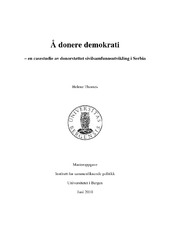| dc.description.abstract | Civil society support in democratizing countries has become a central focus of international donors during the last two decades. Yet, our understanding of the phenomenon and the possible consequences remains incomplete. This thesis attempts to shed light on the phenomenon by exploring an understudied case in the post-communist context: EU and USAID support to Serbian organizations. Based on multiple sources of evidence (interviews with civil society representatives, donor documents, historical literature and statistics), the study seeks to answer the questions: 1) What is the impact of external democracy promotion on civil society structures in Serbia, and 2) what are the implications for the role of civil society in the process of democratic consolidation? The study identifies the main donors and their objectives in Serbia. It further investigates the financial flows for strengthening civil society" and the impact on number and type of organizations, participation (in terms of organizational membership) and how this relates to corruption and (social and institutional) trust. Furthermore, the study seeks to examine the implications for the possibility of the organizations to play an internal and indirect and/or an external and direct role in the process of democratic consolidation. The analysis draws on civil society theory, theories on democratic consolidation and literature on international aid in general. The case study method is especially suitable for investigating the processes that unfold between historical conditions and external attempts to bring about or strengthen civil society. I argue that it is essential to avoid normative presumptions: When studying how donors plant seeds for grass roots", it is necessary to consider home-grown" organizational expressions, which donors often perceive as uncivil society". In the Serbian case, this relates to the Orthodox Church and its more or less loosely connected organizations. The thesis shows that funding has been accompanied by an increase in the number of NGOs, but it finds no support for an increase in participation in general as previously assumed. Linking this finding to low social and institutional trust - including low trust in NGOs - the study indicates an inextricable contradiction in building civil society and democracy from the inside and below with donor support from the outside and above. More specifically, it reveals a set of contradictions between theory (donors' ideas) and practice (donors' implementation), and suggests that these are connected to the donor systems' inherent features, which are of a consensus-oriented and results-focused character. The findings may have implications for donors as practitioners and on academic theory building. | en_US |
